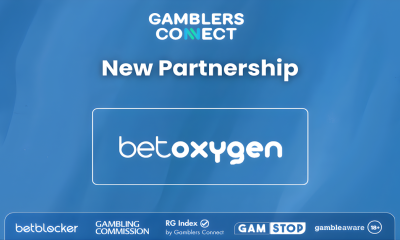Baltics
Modern Oracles & Smart Payments: Finrax’s Vision for Blockchain, AI & Beyond

Finrax steps into the spotlight as the official Lanyards Sponsor at HIPTHER’s MARE BALTICUM Gaming & TECH Summit 2025 in Vilnius, bringing with them a next-gen crypto payment gateway and a bold vision that extends far beyond payments.
We sat down with Konstantinas Balakinas, CEO of Finrax, to discuss the future of AI in finance, the real-world potential of blockchain beyond the buzzwords, and how Finrax plans to bridge fintech innovation with eCommerce and beyond.
Konstantinas, thank you for joining us! Can you please introduce yourself to our readers, and share more about your professional background and role in Finrax?
Thank you — it’s a pleasure to be part of this conversation, especially as Finrax steps into a more visible role at this year’s summit.
I’ve been working in the financial industry since 1999, mostly in regulated environments. The bulk of my career has been in consumer finance, where I had the chance to grow several companies from the ground up and eventually guide one through the process of securing a specialized bank license. That experience taught me a lot about how to build resilient financial infrastructure — and how to adapt when the rules, tools, and expectations shift.
My interest in AI came later. I had a first-hand look at its practical impact while working with a Lithuanian EMI that was really leaning into AI-driven operations. That sparked something — and eventually led me to study AI for Business Analytics at Turing College, where I’m currently sharpening both technical and strategic understanding of how AI can reshape financial services.
At Finrax, I serve as CEO and Chair of the Management Board in its Lithuanian entity. Our mission goes beyond crypto payments — we’re focused on building real utility for digital assets in a way that businesses can trust and adopt without friction.
How do you see today’s AI solutions? Can they be truly predictive, like “modern oracles”, or are we still in the realm of reactive technology?
AI today is generative AI — especially large language models (LLMs), which have made impressive progress in producing human-like text and anticipating user intent. So in a technical sense, yes — these systems are predictive, but not in the way many assume. What they predict is not the future itself, but the next statistically likely word or phrase based on patterns learned from massive datasets. That creates the appearance of intelligence, but not true comprehension.
This distinction is essential. As Carl Bergstrom and Jevin West explain in The Bullshit Machines, LLMs can sound coherent and authoritative while having no actual grasp of truth. They generate content that feels convincing, regardless of whether it’s accurate or logically sound. That’s not a flaw — it’s how they’re designed.
One should approach these tools with both optimism and caution. Today’s AI still sits within the boundaries of Artificial Narrow Intelligence — excellent at specific tasks like pattern recognition, anomaly detection, and content generation, but still a long way from Artificial General Intelligence, which would reason and adapt like a human across any domain. And Artificial Superintelligence, capable of recursive self-improvement and independent thought, remains firmly theoretical.
So, while we admire the capabilities of today’s generative AI, we don’t mistake fluency for understanding. These are powerful tools — but not oracles. The real challenge is using them responsibly and building systems around them that make sense in the real world.
What are some practical ways AI is and could be integrated into Finrax’s crypto payment platform? Are there use cases you’re already exploring or see as promising?
I see three core domains where AI tools offer real practical value — not just for Finrax, but for any fintech building towards efficiency, scale, and regulatory clarity.
The first is internal productivity. AI works well as a personal assistant for employees — helping with everything from drafting emails to summarizing documents or generating code. Off-the-shelf tools like ChatGPT are already useful for this, but their impact depends heavily on how well people know how to prompt them. That’s why custom GPTs are especially promising: they allow us to build tailored assistants with topic-specific knowledge and clear task guidance. For instance, an onboarding specialist might use one to walk through a compliant KYC checklist, while a developer could use another to generate smart contract boilerplate or debug Python scripts.
The second domain is AI agents — and this space is moving fast. These systems handle automated, rule-based workflows, often collaborating with other agents to move tasks along. They’re more constrained than LLMs, but more reliable when used within predefined rules. For a crypto payment platform like ours, agents could eventually assist in payment routing, compliance alerts, or even technical monitoring — anything repetitive that benefits from low-latency automation.
The third area is pattern recognition, where AI’s value is most proven. We see strong potential in using it to support fraud detection and ML/TF screening — not to replace human oversight, but to enhance it. Spotting unusual activity, flagging anomalies, or refining transaction scoring — these are all areas where AI can quietly but meaningfully improve risk management.
That said, we’re also realistic about the limits. With the EU AI Act now on the horizon, every integration has to pass the test of explainability, compliance, and accountability. Any system we deploy will need a clear inventory, GDPR alignment, risk assessment, and, in some cases, staff training. We’re already looking into how these rules will apply — especially as we explore the potential of agent-based systems.
So yes, we’re enthusiastic — but we’re moving deliberately. We’re not building AI from scratch, but we are actively exploring how to apply it in meaningful ways — both internally and within our services. Our business development team is already using tools like ChatGPT in their day-to-day work, and we see real gains in productivity and clarity. That’s the direction we’re leaning into: using AI where it helps people do their jobs better, not just to check a box.
Finrax has built a strong reputation for reliability and speed – processing crypto payments in under a minute. What differentiates your platform from other solutions currently available on the market?
Reliability is the real star here. Speed is expected in blockchain-based systems — but combining that speed with stability, predictability, and regulatory clarity is a much harder problem to solve. That’s exactly where Finrax delivers.
We’ve built a platform that doesn’t just move fast — it does so in a way businesses can actually depend on. We offer fixed-rate settlements to remove volatility, giving partners certainty about what they’ll receive. That’s especially important in high-volume environments, where financial precision matters just as much as transaction speed.
Compliance is also baked in. Every transaction goes through full AML/CTF screening, and our onboarding and monitoring standards are designed to meet the expectations of regulated businesses. That’s not a side feature — it’s part of our foundation.
And while many of our clients have international operations, we’re careful to operate only where we’re permitted to do so. With MiCA coming into force, we’re preparing to scale responsibly, aligned with the new rulebook.
So yes, we’re fast — but more importantly, we’re reliable. And in this space, that’s what truly sets us apart.
What opportunities do you see in the field of eCommerce for a crypto-first payment provider, and what role could Finrax play in shaping the future of online payments?
Crypto is here to stay — and with that in mind, we’re building the tools to help eCommerce businesses accept crypto as naturally as they would any traditional payment method. Our goal at Finrax is to provide plug-and-play solutions that allow online stores across the EU to accept payments in stablecoins or major cryptocurrencies without having to rethink their entire checkout process.
The opportunity goes beyond retail. We see strong potential in industries like logistics, aviation, luxury, and of course, gaming platforms — areas where cross-border payments, speed, and transparency really matter. That said, everything still depends on how quickly users adopt crypto in their day-to-day transactions.
What gives us optimism is the direction regulation is moving. With MiCA coming into effect in the EU, we’re finally getting a clear rulebook — and that’s exactly what’s needed to build trust. Once customers know that only licensed, properly regulated providers can offer these services, it changes the perception. It brings structure to the market — and with structure comes wider adoption.
At Finrax, we’re preparing for that shift. We don’t just want to be ready for the future of payments — we want to help shape it in a way that’s both efficient and trusted.
As the world becomes increasingly automated, how do you see Finrax maintaining a balance between innovation and user-centric service, especially amidst the fast-evolving tech and regulatory landscapes?
Automation, at its core, is about efficiency — but that doesn’t mean we lose sight of the human side. In fact, I’d argue that smart automation should strengthen customer-centricity, not weaken it.
At Finrax, we see automation as a way to free up our people to focus on what actually matters — understanding the client’s real needs, solving problems, and making sure the experience feels consistent and supportive across the board. It also helps us align internal processes more clearly, so that we’re not sending mixed messages to clients. That’s often where customer frustration begins — not with the technology, but with the gaps between systems and people.
Another benefit is the ability to understand customers more precisely. With better data and well-designed workflows, we can respond faster and more accurately, without adding friction.
But none of this can come at the expense of trust. As regulations like MiCA, GDPR, and the EU AI Act begin shaping the environment, it’s clear that automation must be explainable, compliant, and ethically sound. For us, innovation isn’t just about what’s possible — it’s about what’s responsible. And we see that as a competitive advantage, not a constraint.
You’ll be joining the panel “Beyond the Hype” at MARE BALTICUM, discussing blockchain and AI applications in finance and governance. What are you most looking forward to sharing with the audience – and what do you hope to take away from the conversation?
A lot of the hype around AI comes from not really understanding how it works — and I think it’s important to go back to the basics. Most people still assume these systems “know” things. But in reality, large language models are built by training on massive volumes of data — much of it containing human bias, errors, or even outright misinformation. They don’t reason. They predict. They break down language into tokens and map those tokens across hundreds of abstract dimensions — far beyond how we perceive space — then generate output that mimics meaning, even if it’s not grounded in real understanding. But it’s not grounded in fact unless you make it so.
Even the best models will produce an answer to almost anything — even if that answer is fabricated. That’s why we see hallucinations. Unless you know how to prompt properly and critically assess the output, the result might sound confident while being completely off. This is why I always say: at this stage, AI should be seen as an assistant, not an authority. The human must remain in the loop — and at the top.
That said, the future isn’t bleak — it’s exciting, if we use these tools responsibly. One example that stands out to me is what Stripe recently did. They trained an AI model not on words or code, but on tens of billions of payment transactions. The model learned the “language” of money — identifying how payments behave, how fraud patterns look, and what hidden connections exist between different data points. The result? They went from detecting 59% of sophisticated card testing fraud attempts to 97% — almost overnight. That’s not just a technical win — it’s a complete shift in how we think about structured financial data.
So on this panel, I’m hoping to bring two things to the table: first, a grounded reminder that no model is infallible, and second, a practical optimism. AI has the potential to make finance faster, smarter, and safer — but only if we stay thoughtful about how we design, train, and regulate it. Humans should come first — but we don’t need to fear the future if we build it wisely.
Meet Konstantinas Balakinas and the Finrax team live at the MARE BALTICUM Gaming & TECH Summit 2025 on 27–28 May in Vilnius.
🔗 Register now to learn more about blockchain-powered finance, crypto innovation, and the real tech shaping tomorrow’s payments.
The post Modern Oracles & Smart Payments: Finrax’s Vision for Blockchain, AI & Beyond appeared first on European Gaming Industry News.
Baltics
DATA.BET Now Powers Esports for Entain NCE Across Baltics & Nordics

Reading Time: 2 minutes
DATA.BET, a leading sportsbook solution supplier, has signed a content deal with Entain NCE, to strengthen the esports betting offer of their brands (Optibet and Klondaika) across the Baltics and Nordics – with Estonia as a key rollout market.
Through the collaboration, Entain and its portfolio of brands will receive DATA.BET’s premium esports coverage. The package includes a comprehensive Odds Feed, Risk Management, Bet Builder and a suite of engagement Widgets – Pitch Tracker (interactive 2D map), Scoreboards (visual representation of player statistics), live Video Streaming, Statistical Widgets (team history and game stats) and a Multi Widget that unites all these tools within one screen. The partnership is designed to help Entain brands and their clients increase profitability in esports by combining precise pricing and risk controls with engagement tools that lift turnover and margin.
With the deal, Entain’s customers get access to DATA.BET’s 30+ disciplines and over 10,000 monthly events, delivered with a down-to-the-second bet delay across leading titles such as Counter-Strike 2, Dota 2, Valorant, League of Legends and others. A phased expansion of additional disciplines and features will follow to meet Entain’s demand.
“This partnership sets a high bar for product excellence. Our role is to power that ambition with an esports layer that’s rich in content and strong on risk, enabling consistent margins and a best-in-class customer experience. We’ve aligned on a clear roadmap to scale, with more Entain brands scheduled to join the rollout next,” said Otto Bonning, Head of Sales at DATA.BET.
“We are thrilled to partner with DATA.BET who are renown for being the leading Esports provider and who share the same passion and commitment for Esports as we do. DATA.BET’s deep understanding of the esports ecosystem and its growing influence among modern audiences makes the collaboration a perfect fit. Together, we aim to elevate esports and deliver the best experience and entertainment to the fans across Baltics and Nordics regions,” said Hendrik Ahuna, Director of Sportsbook at Entain NCE.
The post DATA.BET Now Powers Esports for Entain NCE Across Baltics & Nordics appeared first on European Gaming Industry News.
Baltics
SYNOT Games Announces Strategic Partnership with Boost Casino

Reading Time: 2 minutes
In a move that further reinforces its footprint across regulated European markets, SYNOT Games has announced a new partnership with Boost Casino, a prominent platform in Estonia. The collaboration brings certified SYNOT titles, including some of the studio’s latest and most innovative releases, to the casino’s rapidly growing grid.
Players on Boost Casino can now enjoy brand-new titles such as the mystical Respin Multi Joker, 40 Coins of Chance, or Rio Mystery Night. These additions expand Boost Casino’s offering with a spectrum of engaging mechanics, premium design, and mobile-first performance, ensuring the highest-quality entertainment for the Estonian audience.
The agreement is part of SYNOT Games’ strategic initiative to solidify its presence in licensed, regulated markets, providing innovative content through partnerships with established and trusted regional operators.
Martin Krajčí, Chief Commercial Officer at SYNOT Games, said: “We are excited to bring our portfolio to Estonian players through this strategic alliance with Boost Casino. Estonia represents a market with great potential and an audience that appreciates quality, variety, and innovation. Boos Casino’s agility and commitment to delivering premium entertainment make them an ideal partner for our continued Baltic expansion.”
Boost Casino, known for its user-centric approach and cutting-edge platform, views the addition of SYNOT Games content as a key enhancement to its offering and a testament to its mission of hosting best-in-class gaming experiences.
Janis Bariss, Head of Gaming, Entain Baltics & Nordics at Boost Casino, said: “Teaming up with SYNOT Games is an exciting opportunity to enhance our content library with vibrant, engaging titles that truly connect with today’s audience players. Their blend of storytelling, striking visuals, and proven game performance perfectly complements our vision for the future of digital gaming in Estonia.”
This collaboration not only empowers Boost Casino to further differentiate its portfolio but also underscores SYNOT Games’ long-term commitment to regulated growth, responsible gaming and working exclusively with trusted local operators—a model increasingly valued by players and regulators.
The post SYNOT Games Announces Strategic Partnership with Boost Casino appeared first on European Gaming Industry News.
AI customer service
Introducing the newest testing tool for AI-boosted customer engagement

Reading Time: 2 minutes
Is AI technology really at the point where it can truly add value to customer engagement? Tugi Tark’s new sandbox environment allows operators to find out.
Tugi Tark, the Estonian-based international AI customer service company, has launched its sandbox this week with the aim of giving operators the ability to explore how AI could work for their players, using their specific casino policies and player profiles, all in a real-world scenario.
By testing an unlimited number of situations wherein players interact with AI agents, the sandbox allows operators to experience how conversations and escalation flows would work if they implemented Tugi Tark as their customer service solution.
Harpo Lilja, CEO of Tugi Tark, explains: “The sandbox is essentially a controlled environment we’ve created where operators can test the AI agent capabilities against their own needs. They can configure the sandbox to their specific casino policies and adjust the agent’s tone of voice — which gives them a first-hand preview of how our AI agent can serve their players.
He continues: “One reason we built the sandbox is that we know from conversations with operators that people are still hesitant about whether AI solutions have reached a point in customer service where the impact is worth implementing – or if AI technology is still at a level where it risks alienating players due to poor quality. And people don’t want to commit if they don’t really know what they’re getting, which is often the case, as companies usually don’t provide enough testing to do so.
What does the sandbox allow operators to do?
Tugi Tark’s sandbox can mimic everything operators need to see how it actually works, including:
-
player frustrations
-
technical troubleshooting
-
KYC concerns, bonus requests
-
payment issues, and more.
Casinos can manually add synthetic player data without integration, which showcases how well the AI agent can handle player inquiries when it has access to both policy documentation, player data, and gaming history.
Tugi Tark’s hybrid AI model blends operational automation with human oversight, focused on compliance, emotional intelligence, empathy, service mindset, and player safety. And now, that’s available for operators to test fully using their own unique circumstances.
The testing environment allows manual casino player profile inputs, such as name, account creation date, birthday, KYC status, account limits, player segment, available bonuses, transaction and game history, and a brand’s all policies.
Using intuitive automation, the AI agent is contextually appropriate for each conversation – there are no drop-down menus or prompts, but rather, ‘natural’ language that mimics how humans communicate. For example, if users misspell, abbreviate, or use slang, the agent will understand, and if not, it will ask follow-up questions until it does.
Another feature that was integrated for customer comfort is that if a player is a little vague, rather than return the classic AI chatbot “I didn’t understand your inquiry”, the agent can check all the KYC documentation, including status, player history, exact amounts and date, so it can ask intuitive follow-up questions and arrive at a solution more quickly and thoroughly.
“With the sandbox up and running, any operator in dozens of languages and geos is able to test how Tugi Tark’s AI agents will work, on their site, within their player base. That means without having to endure lengthy sales pitches or commit to a product, operators are able to test exactly what it’s like having our technology work for them,” concludes Lilja. “And the great thing is that the entire process has a setup time of 30 minutes.
The post Introducing the newest testing tool for AI-boosted customer engagement appeared first on European Gaming Industry News.
-

 iGaming News 20263 days ago
iGaming News 20263 days agoSpinomenal Rings in 2026 with Japanese-Inspired “Kami Reign Ultra Mode”
-

 Hold and2 days ago
Hold and2 days agoPragmatic Play Rings in 2026 with Joker’s Jewels Hold & Spin™
-

 Five Elements Slot3 days ago
Five Elements Slot3 days agoPG Soft Concludes 2025 with High-Volatility Launch: Mythical Guardians
-

 Latest News3 days ago
Latest News3 days agoFrom ‘Mummyverse’ to Crash Games: Belatra Reviews a Landmark 2025
-

 Bespoke Gaming Studio2 days ago
Bespoke Gaming Studio2 days agoCreedRoomz and Casumo Forge Strategic Partnership to Elevate Live Casino Experience
-

 B2B gaming software3 days ago
B2B gaming software3 days agoGamblers Connect and BetOxygen Announce Strategic B2B Partnership
-

 Button Blind3 days ago
Button Blind3 days agoStretch Network Boosts Player Engagement with Year-End Platform Enhancements
-

 card games1 day ago
card games1 day agoQTech Games Supercharges Video Poker Vertical with Speedy Tomatoes Partnership

















